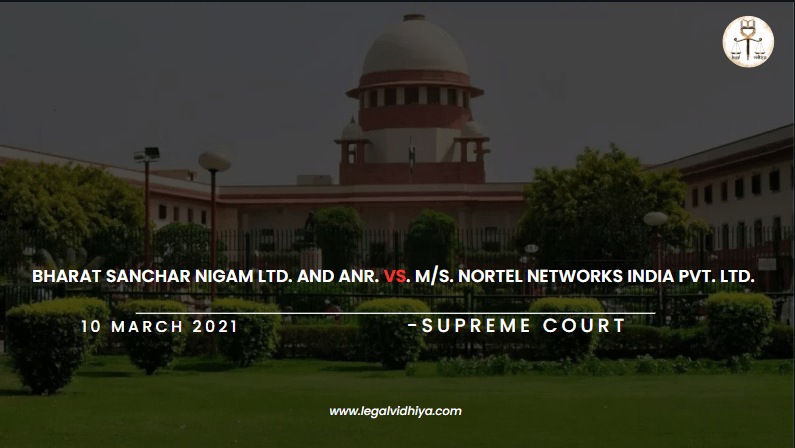
| CITATION | AIR 2021 SUPREME COURT 2849 |
| DATE OF JUDGEMENT | 10 March 2021 |
| COURT | Supreme Court of India |
| APPELLANT | Bharat Sanchar Nigam Ltd. and Anr. |
| RESPONDENT | M/s Nortel Networks India Pvt. Ltd. |
| BENCH | Ajay Rastogi and Indu Malhotra |
INTRODUCTION
The case of Bharat Sanchar Nigam Ltd. and Anr. vs. M/s Nortel Networks India Pvt. Ltd. states if the limitation period mentioned under the Limitation Act, 1963 is applicable to arbitration clause under the Arbitration and Conciliation Act, 1996 mentioned in a contract.
FACTS
- A purchase order was granted to the respondents by the appellants under a tender process.
- During payment of the same, the appellant deducted some amount from payment for the reason of some liquidated damages and levies.
- When the respondents filed for claim, the appellant denied the claim. After a period of five and a half years, the respondents invoked the arbitration clause mentioned under the agreement which they had entered earlier.
- The respondents filed an application before the Kerala High Court for appointment of an arbitrator under Section 11 of the Arbitration and Conciliation Act, 1996 and thus the said case was referred to arbitration.
- This decision of Kerala High Court was requested for judicial review which was dismissed. Thus an appeal was filed by the appellant in the Supreme Court.
ISSUES
- Whether there is a limitation period to file an application under Section 11 of the Arbitration and Conciliation Act, 1996, if there is one, when does it commence?
- Whether the Court can refuse to make the reference under Section 11 where the claims are time barred?
CONTENTIONS OF APPELLANT
- The Appellant had deducted certain amount from the payment to respondents and also rejected the claim of respondents for the same.
- When respondents intended to go for arbitration, appellant contended that the respondents had slept on their rights as the limitation period to file application had been expired.
- Appellant further applied for judicial review to Supreme Court for the same reason which proved to be unsuccessful.
CONTENTIONS OF RESPONDENT
- Respondent contended that the payment deduction by the appellant was improper and filed for its claim.
- When the claim was rejected, respondent invoked arbitration clause and requested for appointment of an arbitrator to solve the matter.
- Respondent approached the Kerala High Court and filed application under Secton11 of the Arbitration and Conciliation Act, 1996 when the appellant said that limitation period had expired.
JUDGEMENT
The Supreme Court observed that Section 43 of the Act provides for applicability of the Limitation Act, 1963 for all proceedings except when it is excluded. Further, the limitation period applicable to claims in this case, is different from as applicable when Section 11 is filed.
The Court held that the application filed by the respondents under Section 11 is within the limitation period. The application under Section 11 was filed before the Kerala High Court within 3 years of rejection of the request for appointment of arbitrator.
Only in some exceptional cases, where claims are time barred, the court may refuse to make the reference. Thus the Supreme Court affirmed the decision of the Kerala High Court.
ANALYSIS
The respondent made sure to make the arbitration clause applicable, giving importance to the form of outside court settlement. When the question arose in relation to inter connection of two Acts, the superior court made a study of all relevant sections such as Section 8, Section 9(2), Section 13, Section 16(2) and Section 34(3) of the Arbitration and Conciliation Act, 1996. The Court explained the relation of limitation period and its applicability while filing application under Section 11 of the Arbitration and Conciliation Act, 1996 by referring certain cases like National Insurance Co. Ltd. vs. Boghara Polyfab Pvt. Ltd. (2009) and State of Goa vs. Praveen Enterprises (2012). The Court also observed that the period of limitation to file under Section 11 is unnecessarily long that is three years from date of refusal to appoint the arbitrator or on expiry of 30 days, whichever is earlier. The purpose of Act which states expeditious disposal of cases is also hampered due to the same provision.
CONCLUSION
The Apex Court clarified that the period of limitation given under Article 137 of First Schedule of the Limitation Act, 1963 for filing an application under Section 11 of the Arbitration and Conciliation Act, 1996. The ruling stated the importance of acting within stipulated time period. This case proves helpful in field of arbitration law as it provides that the parties ensured adherence of the arbitration clause included in the agreement.
REFERENCES
- Indian Kanoon https://indiankanoon.org/doc/118956979/
- IPleaders https://blog.ipleaders.in/bharat-sanchar-nigam-limited-and-anr-v-m-s-nortel-networks-india-pvt-ltd-2021-case-analysis/
- Drishti Judiciary https://www.drishtijudiciary.com/landmark-judgement/limitation-act/bharat-sanchar-nigam-ltd-anr-v-ms-nortel-networks-india-pvt-ltd-air-2021-sc-2849
This Article is written by Kavita Rajendra Amin, student of DES’s Shri Navalmal Firodia Law College, Pune; intern at Legal Vidhiya.
Disclaimer: The materials provided herein are intended solely for informational purposes. Accessing or using the site or the materials does not establish an attorney-client relationship. The information presented on this site is not to be construed as legal or professional advice, and it should not be relied upon for such purposes or used as a substitute for advice from a licensed attorney in your state. Additionally, the viewpoint presented by the author is of a personal nature.




0 Comments